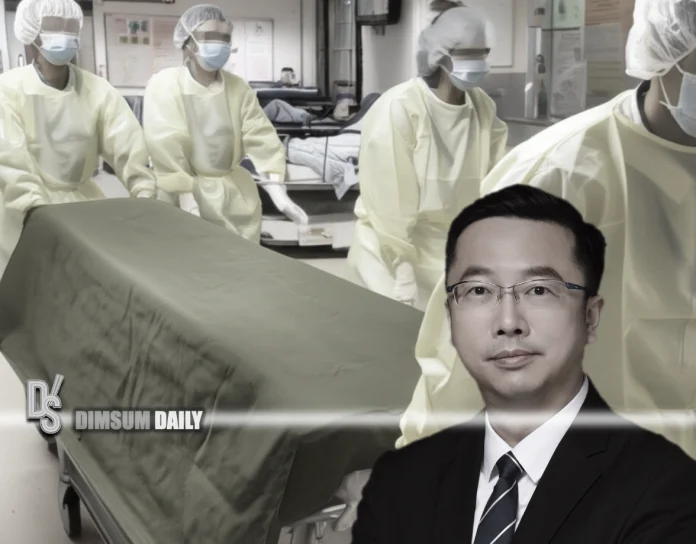 Insert picture: Dr. Michael Wong
Insert picture: Dr. Michael Wong
8th November 2025 – (Hong Kong) Hong Kong’s public hospital mortuaries will begin charging storage fees from 1st January 2026, following a policy adjustment that extends the grace period from three days to 28 days amid public concern. From the 29th day, a daily fee of HK$200 will apply, rising to HK$550 per day from the 36th day. The Hospital Authority said the revised scheme aims to manage capacity more effectively while safeguarding families facing hardship through targeted exemptions.
Dr Michael Wong, Director (Quality and Safety) at the Hospital Authority, noted that the current median storage duration is three weeks, with more than 80% of cases concluded within 28 days. Under the new arrangements, fewer than 10% of remains are expected to incur charges. He added that demographic pressures are acute: deaths in public hospitals have risen 28% from 32,000 in 2007 to 41,000 in 2024, while mortuary capacity has expanded from about 1,500 spaces to 3,360 over the same period, an increase of 124%.
Despite these expansions, the Authority recorded sustained strain earlier this year. Between February and May 2024, eight hospitals saw mortuary utilisation exceed 100%, peaking at 13 facilities operating beyond full capacity. Officials said the charging framework reflects a user-pays approach intended to curb wastage and prevent recurrent overflows, forming part of wider healthcare reforms.
On fee waivers, the Authority confirmed that eligibility is tied to the deceased’s status. Individuals who received social assistance in life will qualify for a full fee waiver. The mechanism also covers cases involving factors beyond the family’s control, such as those subject to Coroner’s Court proceedings. Families experiencing financial hardship or exceptional circumstances are encouraged to seek assistance from hospital staff to apply for exemptions.
Explaining the decision to lengthen the free period, Dr Wong said consultations were conducted earlier this year, including with patient groups, and further views from the funeral sector and the public were taken into account in recent days. The objective, he said, is to manage usage effectively and avoid utilisation surpassing 100%. He did not directly address whether administrative costs might rise as a result of handling payments and waivers.
Senior Manager (Allied Health/Medical Fee Assistance) of the Hospital Authority’s Cluster Services Division, Priscilla Poon Yee-hung, reiterated that full waivers will be granted for economically disadvantaged families and for special cases. She emphasised that exemption eligibility follows the deceased’s qualifying status, while hospitals will provide support to families in need to navigate applications.
For cases where remains are stored longer than 28 days, Dr Wong said circumstances vary and instances without known relatives are very rare. Hospitals will proactively contact next of kin; where no family can be found, authorities will work with relevant government departments to trace relatives. As a last resort, the Food and Environmental Hygiene Department will assume responsibility for handling unclaimed remains.

